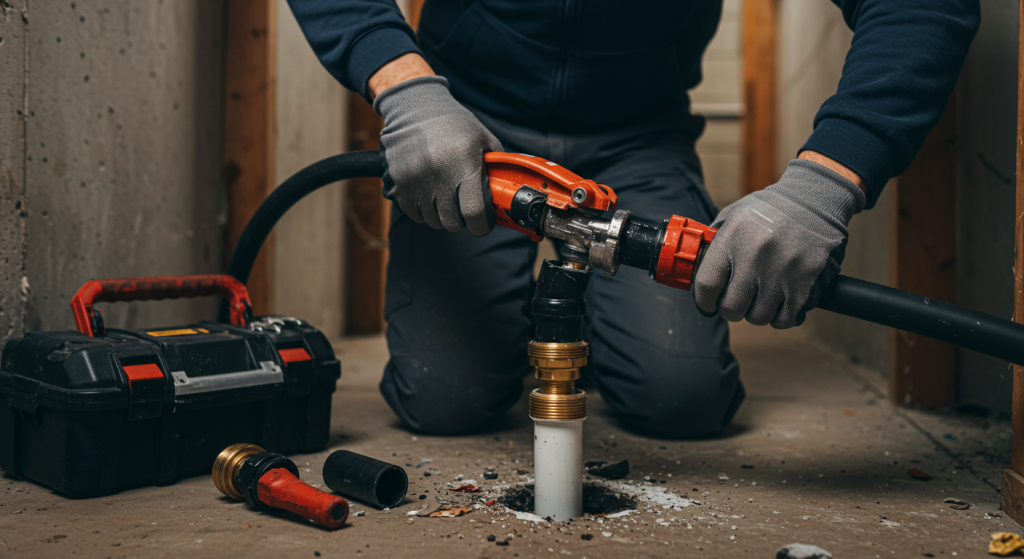
Imagine waking up in the middle of the night to the sound of water gushing from a broken pipe or finding your bathroom flooded just before guests arrive. Plumbing emergencies can happen unexpectedly, causing serious damage if not addressed promptly. Knowing what qualifies as a plumbing emergency can help you take swift action and prevent costly repairs.
Burst Pipes
A burst pipe can release gallons of water in minutes, leading to severe water damage.
Freezing temperatures, aging pipes, or excessive pressure can cause pipes to rupture.
Immediate action: Shut off the main water supply and call a professional plumber right away to prevent further flooding.
Overflowing Toilets
A toilet that won’t stop overflowing can cause water damage and sanitation hazards.
Causes include clogs, sewer line blockages, or faulty float mechanisms.
Immediate action: Turn off the toilet’s water valve (usually located at the base of the toilet) and contact an emergency plumber to diagnose the issue.
No Hot Water
If your water heater suddenly stops producing hot water, it could indicate a major issue.
Possible causes: Failing heating element, malfunctioning thermostat, or a broken gas line.
Immediate action: Check the water heater’s breaker (for electric heaters) or the pilot light (for gas heaters). If the issue persists, do not attempt repairs yourself—contact a professional.
Sewer Backups
Foul odors, multiple clogged drains, or gurgling toilets may indicate a sewer line backup.
A backed-up sewer line can cause raw sewage to enter your home, posing serious health risks.
Immediate action: Avoid using any plumbing fixtures and contact an emergency plumber immediately.
Major Leaks
Leaking pipes, water heaters, or plumbing fixtures can lead to extensive property damage.
Water pooling under sinks, on walls, or ceilings may indicate a hidden leak.
Immediate action: Shut off the water supply and call a professional to assess the issue before it worsens.
Gas Line Leaks
A gas leak is one of the most dangerous plumbing emergencies.
Signs include: A strong sulfur smell, hissing noises near gas lines, or physical symptoms like dizziness or nausea.
Immediate action: Evacuate your home immediately, avoid using electrical appliances, and call emergency services before contacting a plumber.
Frozen Pipes
Frozen pipes can restrict water flow and eventually burst, causing significant damage.
Common in winter, especially in uninsulated areas.
Immediate action: Turn off the water supply and carefully thaw pipes with warm towels or a hairdryer—never use an open flame. Then, call a plumber for further inspection.
Sump Pump Failure
A malfunctioning sump pump can result in basement flooding during heavy rain.
Causes include power failure, debris blockage, or a defective float switch.
Immediate action: Check for power, clear any debris, and if the pump still doesn’t work, call a plumber for urgent repairs.
Clogged or Non-Draining Sinks
A slow drain may not be an emergency, but a completely clogged sink can disrupt daily activities.
A severe blockage could indicate a main line clog, requiring professional attention.
Immediate action: Avoid chemical drain cleaners, as they can damage pipes. Instead, call a plumber for a safe, effective solution.
Low or No Water Pressure
A sudden drop in water pressure can result from hidden leaks, pipe corrosion, or municipal water supply issues.
If no water is coming from your taps, it could indicate a serious plumbing problem.
Immediate action: Check with your water provider and, if the issue persists, call a plumber to diagnose and fix the problem.
What to Do in a Plumbing Emergency
If you experience any of these issues, follow these steps to minimize damage:
- Shut Off the Water – Locate and turn off the main water valve to prevent further flooding.
- Turn Off the Water Heater – Prevents overheating and potential damage to the system.
- Avoid DIY Fixes – Temporary solutions can sometimes worsen the problem.
- Call a Professional – An emergency plumber can quickly diagnose and resolve the issue before it escalates.
How Regular Maintenance Can Prevent Plumbing Emergencies
Routine plumbing maintenance can help you avoid costly emergency repairs:
- Annual Inspections – A professional plumber can detect potential issues before they turn into emergencies.
- Drain Cleaning – Keeping your drains clear helps prevent clogs and backups.
- Pipe Insulation – Protecting pipes from freezing temperatures can reduce the risk of burst pipes in winter.
FAQs About Emergency Plumbing Services
How do I know if I have a plumbing emergency?
If there’s a risk of water damage, safety hazards, or loss of essential services (like hot water or working toilets), it’s an emergency.
Can I temporarily fix a plumbing emergency myself?
You can take short-term measures like shutting off the water supply, but professional repairs are necessary to prevent further damage.
How fast can an emergency plumber arrive in Bainbridge Island, WA?
Swift Plumbing & Heating offers fast response times to handle urgent plumbing emergencies.
What should I do if my sewer line backs up?
Avoid using any plumbing fixtures and call an emergency plumber immediately to assess and clear the blockage.
Do emergency plumbing services cost more?
Emergency services may have higher rates due to immediate response needs, but Swift Plumbing & Heating provides upfront pricing with no hidden fees.
Conclusion
Plumbing emergencies require immediate action to prevent further damage and costly repairs. Whether you’re dealing with a burst pipe, overflowing toilet, or gas leak, having a reliable plumber on call is essential.
If you’re experiencing a plumbing emergency in Bainbridge Island, WA, contact Swift Plumbing & Heating for expert, fast, and reliable emergency services.

